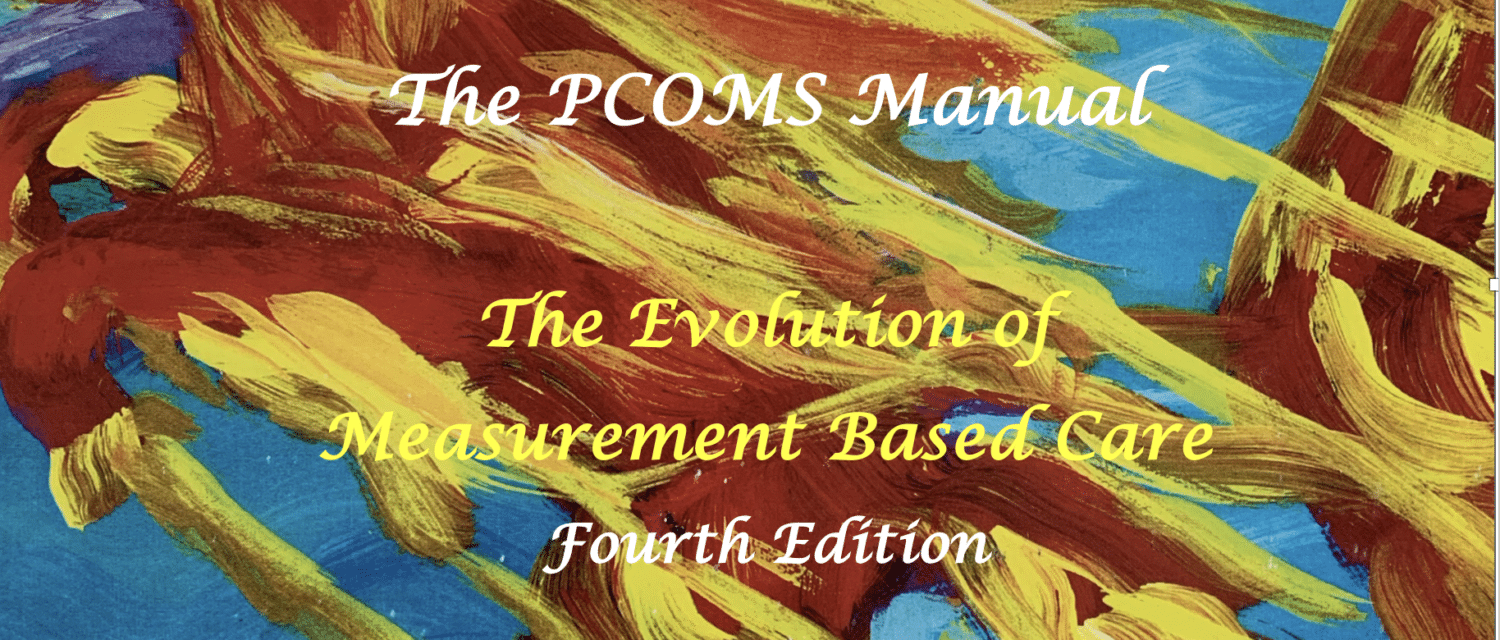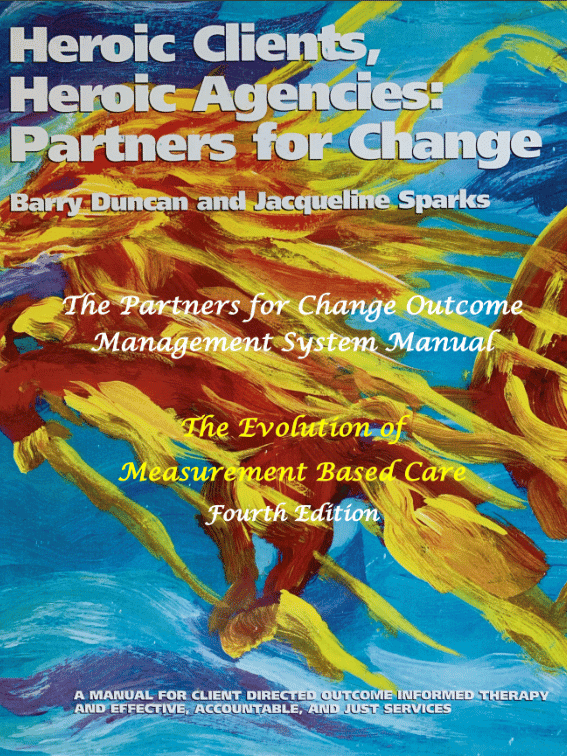The New PCOMS Manual Is Here!

The fourth edition of the Partners for Change Outcome Management System (PCOMS) manual is the latest in a notable lineage of how to practice the fundamental values of client privilege and cultural responsiveness while improving outcomes, reducing dropouts, and honoring the workflow demands of everyday practice. From the creation and validation of brief client-report measures to clinical trials and eventual designation as an evidence-based practice, PCOMS has grown into a mature method designed to improve psychotherapy and social services by centering client views. Capitalizing on the common factors, the “Partners” aspect of PCOMS emphasizes the creative and evolving collaboration between clients and providers in fashioning goals and approaches that fit clients’ unique preferences. Thus, PCOMS embodies a means to ensure that services not only are effective but just, accounting for client culture, social context, and preferences each step of the way.
What is PCOMS?
PCOMS incorporates the most robust predictors of success into a measurement-based care system that partners with clients while honoring the daily pressures of front-line workers. PCOMS uses two, four item scales to solicit service user feedback regarding factors proven to predict success regardless of provider model, orientation, or presenting problem: client assessment of early progress (using the Outcome Rating Scale or ORS) and the quality of the alliance or match with the provider (using the Session Rating Scale or SRS). Unlike other methods of measuring outcome, this system truly gives clients the voice they deserve and assigns consumers key roles in determining how services are delivered. It is the first system to include a transparent discussion of the results with clients and the only system to include routine measurement of the alliance. Assessment, rather than an expert-driven evaluation of the client, becomes a pivotal part of the relationship and change itself.

The History of the PCOMS Manual
PCOMS emerged from everyday practice and an aspiration to privilege the client and incorporate social justice in the psychotherapy process. Concerns regarding the feasibility of longer measures and a desire to honor client privilege and apply the common factors (Duncan & Moynihan, 1994) provided the impetus for the ORS and the SRS. The clinical process of PCOMS was developed from Duncan’s clinical practice and supervision of graduate students in a multicultural clinic and detailed in the first PCOMS manual (Duncan & Sparks, 2002). Over time, psychometric studies were published, and Duncan, Reese, Chapman, and colleagues completed eight RCTs.
As noted, the PCOMS manual series began in 2002 with Heroic Clients, Heroic Agencies: Partners for Change, followed by a digital revision in 2007 and a digital 2nd edition in 2010. The third edition appeared in 2018 bringing an integration of online webinars, videos, and the web-based application of PCOMS, Better Outcomes Now (BON). A revised edition incorporating a new version of BON followed in 2019. The current 4th edition also coincides with a new version of BON. The manual is included in BON subscriptions.
We honor Jacqueline Sparks and the first edition with that same cover of many years ago. This fourth edition reflects the evolution of the ethics and science of systematic client feedback (our favored term) in psychotherapeutic and social services. From the start, PCOMS aimed to promote clients as heroes, not only because empirical evidence rightfully places them in this role but because of our witnessing their courage so many times in daily practice. This manual exemplifies the same attitude. From a promising approach that appealed to helpers disenchanted by rote delivery of pre-packaged models, PCOMS has now arrived mainstream, backed by ten clinical trials and disseminated in diverse treatment/service settings in 20 countries across the globe. The American Psychological Association’s Presidential Taskforce on Evidence Based Practice has recommended that clinicians routinely collect and act on client feedback and it is soon to become a Professional Practice Guideline for psychologists. Concurring, the American Association for Marriage and Family Therapy Task Force on Core Competencies advises therapists to solicit and use client feedback throughout the therapeutic process. Moreover, practice standards, including JCAHO, CARF, and COA are calling for the collection and use of client-generated outcome data. The call for measurement-based care will continue and expand over the next decade.
With a now mature body of research, a priority becomes how best to implement PCOMS. Since the first manual in 2002, the first articulation of the PCOMS clinical process, it has been our intent to provide a practical, user-friendly guide, adaptable to a variety of settings. A system is good only if it is used. This is the purpose of the manual—to facilitate effective implementation of PCOMS. PCOMS provides a broad, over-arching practical umbrella for realizing our long-held ambition to transform therapeutic and social services from provider to client-driven. The current version aims to further PCOMS’ assimilation and our client-directed ambitions into everyday practice.
What to Expect in the Fourth Edition, The Evolution of Measurement Based Care
The fourth edition is divided into four sections designed to be easy to navigate and responsive to a particular question or need in the moment. This edition has been streamlined for easier access to the information you want most. Those wanting more information are directed, via links, to online resources. Section I covers the meat and potatoes of PCOMS, “The 10 Skills of PCOMS.” Each skill of PCOMS is broken down into manageable bitesize chunks with clear step-by-step instructions for realizing the maximum benefit. Although cultural responsiveness and attention to social justice has always been a part of PCOMS, the first section more fully articulates how the skilled use of the ORS and SRS operationalizes these values at the therapist-client level. PCOMS provides a method to attend to marginalization as well as differences of social location between client and therapist.
Section II addresses Special Applications of PCOMS, how PCOMS collaborates with couples, families, groups, case management, and child protection. When you have more than one person in the room or other outside agencies involved, things can get complicated in a hurry. And a lot of questions emerge: “How do you use the measures with children and parents? What about siblings? How can you manage PCOMS in a large group? What about child protection? PCOMS can’t possibly be used in these potentially hostile situations?” These questions are all addressed. But seemingly paradoxically, PCOMS can help smooth out the rough spots and expedite the helping process. Section II articulates the particulars thanks to three of PCOMS’ finest, Jacqueline Sparks, George Braucht, and Robyn Pope who combine PCOMS knowledge with much in the trenches experience.
Section III addresses implementation and supervision, and the secrets therein. With 25 plus years of implementation experience with thousands of organizations across the globe, Barry details what it really takes for successful implementation—not the least of which is leadership and commitment to client privilege and quality improvement.
Finally, Section IV provides an “all in one place” compendium of resources related to PCOMS: the seven rationales for doing it, the extensively researched psychometrics of the PCOMS instruments, and the randomized clinical trial and benchmarking science that support it—with youth & adults, in individual, couple, and group therapy, with both mental health & substance abuse problems, with the impoverished and disenfranchised, and cross-culturally. Also covered are the not-so-common, “Common Factors” as well as the therapist qualities we most like to see.
Check out the Preface, Table of Contents, and Skill 1 of the 10 Skills of PCOMS.
